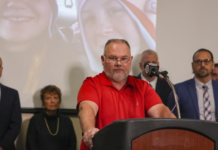The Kosciusko County Jail Chemical Addiction Program will be featured in a three-part video series in February.
Videographers Mason Geiger and Matt Deuel started filming the documentary last week and will continue filming through the end of JCAP in February.
JCAP is a program for inmates in the jail. Up to 15 inmates are selected for each class and are handpicked by Prosecuting Attorney Dan Hampton. The program has graduated two female classes and one male class. The fourth men’s group got underway two weeks ago.
The program is coordinated by Courtney Jenkins, who works to partner with organizations and businesses in the community to get involved by coming in and teaching classes and making connections. The Bowen Center, True Purpose Ministries, New Life Christian Church, B45.org, Purdue Extension Office, A Bridge To Hope, The Beaman Home, Kosciusko Human Resources Association, Lake City Bank, Fellowship Missions, Warsaw Adult Education, Pathways Church, SMART Recovery, Combined Community Services, Serenity House, Rose Garden and Bright Point are all contributors to the program.
The docu-series, produced by Geiger and Deuel, will be used to show potential contributors what the program is all about and why it’s important, Jenkins said.
Kosciusko County Sheriff Kyle Dukes touts the program whenever he can and said this film will be a chance to tell the whole story from behind the scenes. Dukes said Geiger and Deuel will speak with family members of the inmates, law enforcement, past JCAP graduates and follow this group “from A to Z until completion.”
Jenkins said the first segment will be about her family’s story and how she got so involved with the program and why it means so much to her. Jenkins said her son is currently incarcerated in the jail and is a meth and heroin addict. Jenkins said the videographers came to her house and interviewed her and her family for almost five hours.
The second segment will feature the perspective from law enforcement and include ridealongs with the sheriff. Geiger and Deuel took their cameras in Dukes’ sheriff truck and went on two drug overdose calls, Dukes said.
“It will really show what we’re dealing with, what the problem is,” Jenkins said.
The second segment also will feature interviews with JCAP graduates who are now on work release. That will lead into the third segment of the documentary that will focus on the community contributors and what the program means to them, and interviews with JCAP students.
Each episode will be around 10 minutes long, Jenkins said, and will come out at the same time in February.
“We will use it for a promotional video to take to businesses and organizations, and show them the need for programming, the need for help,” Jenkins said. “I want to see people get help.”
Jenkins said JCAP’s growth and popularity is remarkable.
“Initially, people in the jail thought we were using it as a snitch program,” she said. “So, it’s been interesting to see the change in that thinking.”
The current JCAP class has 11 students, out of the 70 that applied. The application process is strict, Jenkins said. She also said after the inmates are released, they’re tracked for two to three years to make sure they don’t pick up any new charges. Jenkins said KCSO wants to be a source of contact for people who need help.
Geiger, who has operated Mason Geiger Film since 2013, and Deuel, who owns One Voice Media, were the creators behind the Warsaw Police Department and Warsaw-Wayne Fire Territory recruitment video earlier this year.
“They contacted us to help share the story of JCAP after seeing the police recruitment video,” Geiger said. “They said they loved it, but after sitting down and really kind of hearing the story of JCAP and what they do, we decided the type of video they needed was different.”
While this is a paid gig, Geiger said, he also said it’s become a passion project for him and Deuel. Dukes said the making of this documentary will cost the taxpayers “zero.” The funding, Dukes said, will come from commissary jail funding.
“So, it’s kind of like the inmates are paying for something that’s for the inmates,” Jenkins said.
“We want to be able to tell the stories well and do it justice,” Geiger said. “So, we’re going to be fully immersed in this for the next four months.”
Dukes said he can’t wait to see where the project goes, even floating the idea of shopping it around to TV networks like A&E. Nothing is in the works for that now, he said, adding, “Fighting the addiction is one of my top priorities.”





